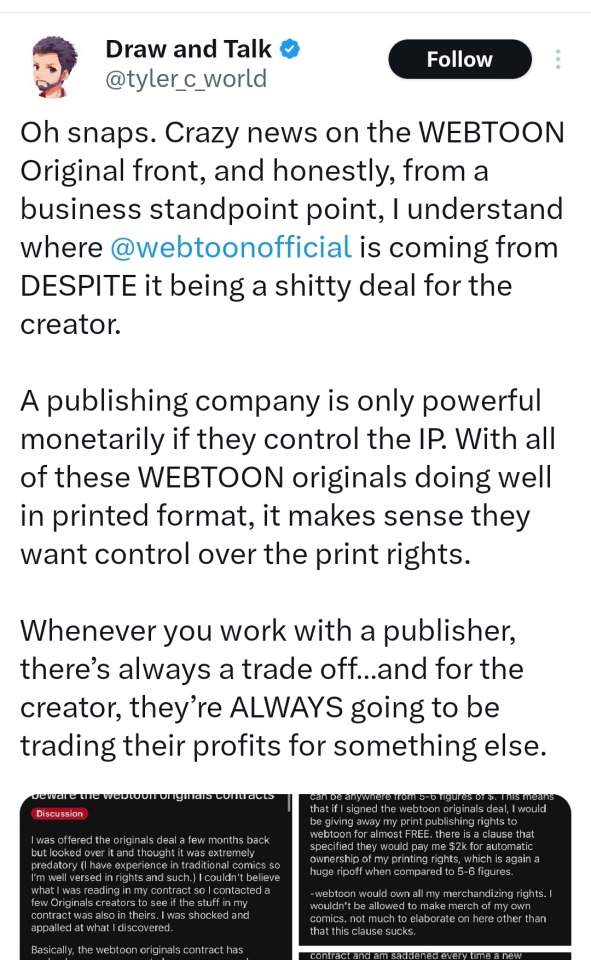#Asset Protection From Lawsuits
Text


NOBODY needs to be defending these people. Major publishers, studios, streaming services, Tesla, Apple, Adobe, Amazon, social media companies- there isnt a single altruistic bone caught in their teeth. Profit from the output of exploited and captive labor IS their product now. When their contacts look like the one in question, the company is clearly stating that shareholders are the customers, not us!
Why else would it be anything but a stupid idea for Amazon to just nuke the majority of Comixology's self-published titles when they consolidated their services? If our experience was really foremost in their minds, why would they repeatedly purge, censor, demonitize, bury, and delete popular accounts with robust followings if not to allay the moral brainworms of shareholders and investors?
Forfeiting rights to our IP is not a "shitty deal," it's surrendering any potential ability to make money off of your own creative work. It's selling your property to a board of accountants to pitch into a portfolio. It's theirs to trot out as long as it's profitable and bury the instant its projected profit dips too close to the cost of maintenance. Hell, we've seen services drop popular series just because their projected profits started to flatten out! Mothballing it also has the added bonus of removing it from the market to further minimize potential competition. Like how there just weren't spider man movies for ages because the owner of the property didn't think it was worth developing but worth too much to sell.
They will make more money from suing you for trying to reclaim IP they mothballed than you did selling it to them in the first place. I guaranteee their budget for lawsuits is a lot deeper than the one they pay their "original" artists from.
By virtue of being a big, profitable, corporation, "their" IP is going to have an astronomically higher value in a court of law than any individual creator. The financial "damage" will be higher for infringing on their copyrights than any amount you can claim on your own. When it becomes theirs, their connections, their infrastructure, their reputation makes it an asset with much more value than you or I can possibly claim. So if you try to steal a bite back from them it's a bite of a *potentially* multimillion-dollar series. In their eyes, they bought the totality of your work, which you agreed was worth the price they gave you. It's value becomes more dependent on who owns it than whether it's even good.
You may not have the same potential to become flash-in-the-pan, short-term succesful without their resources, but you will still own your rights to distribute, alter, preserve, promote, and negotiate your share if you still own your work. That is worth everything as a creator who is passionate about what you've made and committed to protecting it.
The most effective power we can exercise as artists is our ability to say, "no" when someone else wants to pay us a disadvantageous fraction of our worth. You may lose potentially lucrative opportunities but "opportunities" presented by companies like Facebook or Twitter, whose real product is a platform for ads and data collection, with content as bait, are not opportunities to thrive on as independent artists. This specifically is an opportunity for the company to acquire property.
The myth that the publisher's strength is something for us to exploit, without them getting the lion's share is a trap that they feed from at will.
People like the poster up top are opportunists who see the process as a pipeline towards trading low-investment content for financial treats and maybe a share of ad revive. They're stalking horses for companies to exploit more talented but less experienced artists who are facing a daunting and overwhelming market where their work becomes harder and harder to show, let alone sell. A quick deal may feel like a win but it's selling the cow to save money on bottling the milk. Artists like this serve the publisher by making it seem like signing away your rights are just a necessary part of the game. However it's a game they are playing with exceedingly cheap stakes that weren't going to succeed on their own merit. So what if Mr. Business Perspective loses rights to his sexy Mario Bros. parody to a huge company? The point was always to unload it because it's a product, a bartering chip, a trinket. He's a Business Man, so he sees tactics that maximize profits to the business as maximizing their ability to buy whatever shiny tripe he cranks out. The business is his customer, not the reader. The business is his ally, not the creative community. Fuck him and fuck anyone who tells you the exposure is worth a damn if you don't retain rights to your work.

116 notes
·
View notes
Text
The US Department of Justice had long been expected to file an antitrust lawsuit against Apple. But when the suit arrived Thursday, it came with surprising ferocity.
In a press conference, attorney general Merrick Garland noted that Apple controlled more than 70 percent of the country’s smartphone market, saying the company used that outsize power to control developers and consumers and squeeze more revenue out of them.
The suit and messaging from the DOJ and 15 states and the District of Columbia joining it take aim at Apple’s most prized asset—the iPhone—and position the case as a fight for the future of technology. The suit argues that Apple rose to its current power thanks in part to the 1998 antitrust case against Microsoft, and that another milestone antitrust correction is needed to allow future innovation to continue.
Like the Microsoft case, the suit against Apple is “really dynamic and forward looking,” says John Newman, a law professor at the University of Miami. “It's not necessarily about Apple seeing direct competitors,” he says. “It's more about them trying to grab the territory you would need if you were going to even try to compete against Apple.”
Antitrust action in the tech industry has been a focus of the Biden administration’s agenda, which has seen suits brought against both Amazon and Google by the DOJ and the Federal Trade Commission. “This case demonstrates why we must reinvigorate competition policy and establish clear rules of the road for Big Tech platforms,” Democratic senator Amy Klobuchar told WIRED in a statement.
Rebecca Hall Allensworth, a law professor at Vanderbilt University, says that though the government almost always faces an uphill battle in antitrust cases, the Apple case appears relatively solid. “It's a lot stronger than the FTC Amazon monopolization lawsuit from last year,” she says. “And yet, it's very hard to win antitrust cases.”
In a statement, Apple spokesperson Fred Sainz said that the lawsuit “threatens who we are and the principles that set Apple products apart in fiercely competitive markets,” including the way its products work “seamlessly” together and “protect people’s privacy and security.”
Apple has long argued that keeping its mobile operating system, app store, and other services closed offers greater security and safety for customers. But Newman says that the DOJ complaint indicates that Apple doesn't enforce these policies consistently as would make sense if the goal was to protect users.
“Instead [Apple] heavily targets the types of app developers that pose the biggest competitive threat to Apple,” Newman says. The DOJ alleges that restrictions Apple places on iMessage, Apple Wallet, and other products and features create barriers that deter or even penalize people who may switch to cheaper options.
History Repeating
The antitrust case against Microsoft in the late 1990s accused the company of illegally forcing PC manufacturers and others to favor its web browser Internet Explorer. It is widely credited with causing the company to be slow to embrace the web, falling behind a wave of startups including Google and Amazon that grew into giants by making web services useful and lucrative.
When asked about the threat the new antitrust lawsuit might pose to Apple’s business, a DOJ official noted that “there are actually examples where companies, after having been charged and had to change business practices because they violated the antitrust laws in the long run, end up being more valuable than they were before.” Microsoft, thanks to its success in cloud services and more recently AI, is now the most valuable company in the world.
The Department of Justice said Thursday that any potential remedy was on the table for Apple—implying that even breaking up the company is a possibility. But Allensworth says it is unlikely the government would pursue that outcome. The proposed remedies could more likely force Apple to change its "technological and contractual restrictions on app development, and on interoperability with other phones,” she says. “That is something that could be very meaningful, if that remedy were fully realized and overseen in a good way. But it still leaves Apple basically in control of the ecosystem,” Allensworth says.
Paul Swanson, antitrust partner at the law firm Holland & Hart, sees potential difficulties ahead for the suit. “They're alleging that Apple is excluding competition in the smartphone market by making their products stickier, by making it very attractive to stay within their ecosystem. And the way that Apple does that, according to the DOJ, is that it doesn't cooperate nicely with other companies,” he says. But Swanson says antitrust laws don’t generally require companies to work with others. “A business doesn't violate antitrust laws by terminating or refusing to work with another business.”
This is not the first antitrust case against Apple. In 2020, Epic Games filed a lawsuit against the company, accusing it of anticompetitive behavior, after being kicked off the App Store for offering a version of the Fortnite game that circumvented the Apple’s steep 30 percent fees for in-app purchases. Epic lost the case in the lower courts, and in January the Supreme Court declined to hear the appeal—and Apple announced it would levy a new app store fee on developers.
Newman notes that the government seems to have kept a close eye on that case in constructing the suit launched Thursday. The case was filed in the Third Circuit Court in New Jersey, rather than the Ninth Circuit Court, which includes California. He predicts it will ultimately end up before the Supreme Court. “I think this one's probably going all the way,” Newman says.
12 notes
·
View notes
Text
Three years after receiving a $700 million pandemic-era lifeline from the federal government, the struggling freight trucking company Yellow is filing for bankruptcy.
After monthslong negotiations between Yellow’s management and the Teamsters union broke down, the company shut its operations late last month, and said on Sunday that it was seeking bankruptcy protection so it could wind down its business in an “orderly” way.
“It is with profound disappointment that Yellow announces that it is closing after nearly 100 years in business,” the company’s chief executive, Darren Hawkins, said in a statement. Yellow filed a so-called Chapter 11 petition in U.S. Bankruptcy Court in Delaware.
The downfall of the 99-year-old company will lead to the loss of about 30,000 jobs and could have ripple effects across the nation’s supply chains. It also underscores the risks associated with government bailouts that are awarded during moments of economic panic.
Yellow, which formerly went by the name YRC Worldwide, received the $700 million loan during the summer of 2020 as the pandemic was paralyzing the U.S. economy. The loan was awarded as part of the $2.2 trillion pandemic-relief legislation that Congress passed that year, and Yellow received it on the grounds that its business was critical to national security because it shipped supplies to military bases. Government watchdogs have scrutinized the loan because of the company’s financial turmoil and close ties to the Trump administration, which awarded the loan.
Since then, Yellow changed its name and embarked on a restructuring plan to help revive its flagging business by consolidating its regional networks of trucking services under one brand. As of the end of March, Yellow’s outstanding debt was $1.5 billion, including about $730 million that it owed to the federal government. Yellow has paid approximately $66 million in interest on the loan, but it has repaid just $230 of the principal owed on the loan, which comes due next year.
The fate of the loan is not yet clear. The federal government assumed a 30% equity stake in Yellow in exchange for the loan. It could end up assuming or trying to sell off much of the company’s fleet of trucks and terminals. Yellow aims to sell “all or substantially all” of its assets, according to court documents. Mr. Hawkins said the company intended to pay back the government loan “in full.”
The White House declined to comment.
Yellow estimated that it has more than 100,000 creditors and more than $1 billion in liabilities, per court documents. Some of its largest unsecured creditors include Amazon, with a claim of more than $2 million, and Home Depot, which is owed nearly $1.7 million.
Yellow is the third-largest small-freight trucking company in a part of the industry known as “less than truckload” shipping. The industry has been under pressure over the last year from rising interest rates and higher fuel costs, while customers have been reluctant to accept higher prices.
Those forces collided with an ugly labor fight this year between Yellow and the Teamsters union over wages and other benefits. Those talks collapsed last month and union officials soon after warned workers that the company was shutting down.
After its bankruptcy filing, company officials placed much of the blame on the union, saying its members caused “irreparable harm” by halting its restructuring plan. Yellow employed about 23,000 union employees.
“We faced nine months of union intransigence, bullying and deliberately destructive tactics,” Mr. Hawkins said. The Teamsters union “was able to halt our business plan, literally driving our company out of business, despite every effort to work with them,” he added.
In late June, the company filed a lawsuit against the union, asserting it had caused more than $137 million in damages by blocking the restructuring plan.
The Teamsters union said that Yellow’s executives unjustly blamed the union for the demise of the company, which had been “plagued with financial trouble for nearly two decades,” officials said in a statement.
“Teamster families sacrificed billions of dollars in wages, benefits and retirement security to rescue Yellow,” said Sean O’Brien, the union’s general president. “The company blew through a $700 million government bailout.” Calling Yellow’s top executives “dysfunctional” and “greedy,” he blamed them for failing to “take responsibility for squandering all that cash.”
The bankruptcy could create temporary disruptions for companies that relied on Yellow and might prompt more consolidation in the industry. It could also lead to temporarily higher prices as businesses find new carriers for their freight.
“Those inflationary prices will certainly hurt the shippers and hurt the consumer to a certain extent,” said Tom Nightingale, chief executive of AFS Logistics, who suggested that prices would probably normalize within a few months.
In late July, Yellow began permanently laying off workers and ceased most of its operations in the United States and Canada, according to court documents. Yellow has retained a “core group” of about 1,650 employees to maintain limited operations and provide administrative work as it winds down. Yellow said it expected to pay about $3.4 million per week in employee wages to operate during bankruptcy, which “may decrease over time.” None of the remaining employees are union members, the company said.
The company also sought the authority to pay an estimated $22 million in compensation and benefit costs for current and former employees, including roughly $8.7 million in unpaid wages as of the date of filing.
Yellow had readily accessible funds of about $39 million when it filed for bankruptcy, which it said would be insufficient to cover its wind-down efforts, and it expected to receive special financing to help support the sale process and payment of wages.
Jack Atkins, a transportation analyst at the financial services firm Stephens, said that Yellow’s troubles had been mounting for years. In the wake of the financial crisis, Yellow engaged in a spree of acquisitions that it failed to successfully integrate, Mr. Atkins said. The demands of repaying that debt made it difficult for Yellow to reinvest in the company, allowing rivals to become more profitable.
“Yellow was struggling to keep its head above water and survive,” Mr. Atkins said. “It was harder and harder to be profitable enough to support the wage increases they needed.”
David P. Leibowitz, a Chicago bankruptcy lawyer who represents several trucking companies, said Yellow had found itself in a “perfect storm, and they have not managed that perfect storm very well.”
The company’s financial problems fueled concerns. It lost more than $100 million in 2019 and was being sued by the Justice Department over claims that it defrauded the federal government during a seven-year period. Last year it agreed to pay $6.85 million to settle the lawsuit.
Congressional oversight committees have scrutinized the company’s relationships with the Trump administration. President Donald J. Trump tapped Mr. Hawkins to serve on a coronavirus economic task force, and Yellow had financial backing from Apollo Global Management, a private equity firm with close ties to Trump administration officials.
Democrats on the House Select Subcommittee on the Coronavirus Crisis wrote in a report last year that top Trump administration officials had awarded Yellow the money over the objections of career officials at the Defense Department. The report noted that Yellow had been in close touch with Trump administration officials throughout the loan process and had discussed how the company employed Teamsters as its drivers.
In December 2020, Steven T. Mnuchin, then the Treasury secretary, defended the loan, arguing that had the company been shuttered, thousands of jobs would have been at risk and the military’s supply chain could have been disrupted. He predicted that the federal government would eventually turn a profit from the deal.
“Yellow had longstanding financial problems before the pandemic, was not essential to national security and thus should never have received a $700 million taxpayer bailout from the Treasury Department,” Representative French Hill, Republican of Arkansas and a member of the Congressional Oversight Commission, said in a statement. “Years of poor financial management at Yellow has resulted in hard-working people losing their jobs.”
#us politics#news#the new york times#2023#donald trump#conservatives#republicans#trump administration#yellow corporation#teamsters union#unions#union workers#workers union#bankruptcy#chapter 11#Darren Hawkins#U.S. Bankruptcy Court#coronavirus relief#ppp loans#department of treasury#government bailouts#Sean O’Brien#House Select Subcommittee on the Coronavirus Crisis#steve mnuchin#department of defense#rep. French Hill#Apollo Global Management
14 notes
·
View notes
Text
The Archdiocese of San Francisco, known for its outspoken conservative leadership, has filed for Chapter 11 bankruptcy reorganization, Archbishop Salvatore J. Cordileone announced on Monday. The filing is intended to protect the archdiocese from what Archbishop Cordileone described as more than 500 civil lawsuits filed against it under a state law passed in 2019 that extended the statute of limitations for civil claims in child sexual abuse cases.
“We believe the bankruptcy process is the best way to provide a compassionate and equitable solution for survivors of abuse while ensuring that we continue the vital ministries to the faithful and to the communities that rely on our services and charity,” Archbishop Cordileone said in a letter addressed to Catholics in San Francisco.
Archbishop Cordileone signaled the bankruptcy earlier this month, warning publicly that the filing was “very likely.”
San Francisco is the third archdiocese in the state to file for bankruptcy this year. The dioceses of Oakland and Santa Rosa filed in the spring, citing the number of sexual abuse lawsuits filed against them. The diocese of San Diego, one of the largest in the state, announced in May that it planned to file later this year.
Overall, about a dozen dioceses and archdioceses in the United States are currently in bankruptcy proceedings, according to a list maintained by Marie T. Reilly, a professor at Penn State Law. Still more have emerged from bankruptcy.
The vast majority of documented abuses in Catholic institutional settings took place decades ago, making it challenging for victims to seek legal recourse. But some states, including California and New York, where the majority of pending bankruptcies are, have enacted a “look-back window” in recent years that allows victims to bring civil claims that would otherwise be barred by statutes of limitations.
The Archdiocese of San Francisco, which includes about 450,000 Catholics, is the only diocese in the state to not have released a list of clergy credibly accused of sex abuse, according to lawyers and survivors’ advocacy groups. Instead, the archdiocese maintains a list of priests and deacons in good standing, and removes men from the list if they are under investigation for child sexual abuse.
Archbishop Cordileone, who has led the archdiocese since being appointed to the role by Pope Benedict XVI in 2012, is an outspoken voice in the ultraconservative wing of the American Catholic Church. He helped lead Catholic efforts to pass Prop 8, a 2008 state constitutional amendment intended to ban same-sex marriage in the state.
More recently, he has repeatedly confronted former Speaker Nancy Pelosi, a Catholic who represents much of San Francisco, over her support for abortion rights, saying last year that she would not be permitted to receive communion in the archdiocese.
The filing of Chapter 11 bankruptcy will halt claims against the archdiocese, while it develops a reorganization plan based on its assets and insurance.
The archdiocese itself is the only entity included in the filing, Archbishop Cordileone said in the statement. Parochial schools and individual parishes, which the archdiocese said are independently managed and self-financed, will not be affected.
7 notes
·
View notes
Text
Debt-laden Rite Aid filed for bankruptcy protection on Sunday and said it would close underperforming stores, as the drugstore chain comes under pressure from lawsuits alleging that it helped fuel the US opioid crisis.
The filing will allow it to resolve litigation claims in an “equitable manner”, the company said, adding it had received a commitment for $3.45bn from some lenders, which will provide liquidity during the bankruptcy process.
Rite Aid, which began as a thrift shop in 1962, became the third largest US chain of drugstores in less than two decades with more than 2,000 retail stores in 17 states.
But it was pummeled by lawsuits alleging pharmacies contributed to an oversupply of prescription opioids, which has played a major role in the more than 1 million deaths due to drug overdoses in the United States since 1999.
Rite Aid had a total debt of $8.60bn as of 3 June, according to a filing with the US bankruptcy court for the district of New Jersey, some of which is due in 2025. It also listed total assets of $7.65bn.
5 notes
·
View notes
Note
One question I see once in a rare occasion is “Why not just give game developers assets someone else has made for free in their own time?”whether it’s sent to them from a fan or a dev off work, without using the production’s budget to make them. I know this isn’t fundamentally possible, but I don’t know how to describe it. Maybe you can?

The primary issues with accepting external content submissions are legal. There would need to be some kind of legal agreement set in place to establish the rules (as well as potential damages if those rules are breached) for the use of that content that all parties agree to. This would protect the developer from issues like the content submitter later reconsidering and deciding to sue for partial ownership of the game that their work was used in or for an injunction to stop sales of that game altogether. If that game content was created using libraries, tools, assets, etc. from others, those other rights owners could also have a legal stake in any game created with that content. This is why writing credits and payouts in music get so complicated - sampling other music is similar in principle.

These legal issues are why any sort of fan content submission contest is accompanied by a hefty legal contract that all participants agree to, including granting a perpetual license to the publisher to use that content without needing to pay for it, or even granting full ownership of that content to the publisher outright. This is also why the rank and file developers like me are forbidden from even looking at external content submissions. If something like that inspires me and I use some of those ideas in future content, that's potential grounds to sue. Any such lawsuit probably won't be successful, but it's still enough of a potential problem that default policy is "we never read unsolicited submissions".

Beyond the legal hurdles, there's also the normal issues of content functionality. Even if content gets submitted that we want to use, there's no guarantee that it is compatible with our workflow. A texture might be the wrong dimensions or format, there might be certain assumptions made about a particular piece of data that don't work in all game modes, the submission might overwrite an existing asset and we'd have to create a whole new asset instead of replacing an old one. There's a fair amount of effort that may need to be expended in order to incorporate external work into our internal workflow, and that kind of overhead is often not trivial.
[Join us on Discord] and/or [Support us on Patreon]
Got a burning question you want answered?
Short questions: Ask a Game Dev on Twitter
Long questions: Ask a Game Dev on Tumblr
Frequent Questions: The FAQ
25 notes
·
View notes
Text
Washing my new pants and I've run into the same problem with EVERY pair of pants.
Too big in the waist, too tight in the hip.
-
I discovered that Walgreen's is currently mired in an anti-discrimination lawsuit (specifically in California) and I do tick a bunch of the "equal-opportunity" boxes.
female
disabled
veteran
over 40
It's possible corporate's application algo flagged me as a diversity hire.
I've also learned that many, many stores are being closed. There are two Walgreen's, here, and two CVS. There used to be a Rite Aid but it was replaced by the second Walgreen's. Apparently CVS and Rite Aid are closing a lot of locations, too.
Unfortunately, there doesn't seem to be a list online that I can look at to see if this store is being closed. That would be alright, really. I would have a few months of work and income, insurance for a little while, and then a totally neutral reason for no longer working there.
-
That's kind of weird to me that stores are closing because stocks went down after being high during the height of the pandemic. They're probably still making more money than they did pre-pandemic but it's less than they were making during, so the stores are less valuable and closing, taking all those jobs with them.
Stocks are fucking weird, man.
Looking at the job description and it's basically Do Everything.
Responsibilities
Models and delivers a distinctive and delightful customer experience.
Registers sales on assigned cash register, provides customers with courteous, fair, friendly, and efficient checkout service.
Customer Experience
Engages customers and patients by greeting them and offering assistance with products and services. Resolves customer issues and answers questions to ensure a positive customer experience.
Models and shares customer service best practices with all team members to deliver a distinctive and delightful customer experience, including interpersonal habits (e.g., greeting, eye contact, courtesy, etc.) and Walgreens service traits (e.g., offering help proactively, identifying needs, servicing until satisfied, etc.).
Operations
Provides customers with courteous, friendly, fast, and efficient service.
Recommends items for sale to customer and recommends trade-up and/or companion items.
Registers customer purchases on assigned cash register, collects cash and distributes change as requested; processes voids, returns, rain checks, refunds, and exchanges as needed.
Keeps counters and shelves clean and well merchandised, takes inventory, and maintains records. Checks in and prices merchandise as required or as directed by store manager or communicated by the shift leader.
Implements Company asset protection procedures to identify and minimize profit loss.
Ensures compliance with state and local laws regarding regulated products (e.g., alcoholic beverages and tobacco products).
Constructs and maintains displays, including promotional, seasonal, super structures, and sale merchandise. Completes resets and revisions as directed.
Assists with separation of food items (e.g., raw foods from pre-cooked) and product placement as specified by policies/procedures (e.g., raw and frozen meats on bottom shelves). For consumable items, assists in stock rotation, using the first in, first out method and restock outs.
Has working knowledge of store systems and store equipment.
Provides customer service in the photo area, including digital passport photo service, poster print and creative machine, suggestive sell of promotional photo products.
Assumes web pick-up responsibilities (monitors orders in Picture Care Plus, fills orders (pick items), delivers orders to customers as they arrive at store).
Assists with exterior and interior maintenance by ensuring clean, neat, orderly store condition and appearance.
Complies with all company policies and procedures; maintains respectful relationships with coworkers.
Completes special assignments and other tasks as assigned.
Training & Personal Development
Attends training and completes PPLs requested by Manager or assigned by corporate.
Basic Qualifications
Must be fluent in reading, writing, and speaking English. (Except in Puerto Rico)
Requires willingness to work flexible schedule, including evenings and weekend hours
Preferred Qualifications
Prefer six months of experience in a retail environment.
Prefer to have prior work experience with Walgreens.
Prefer to be fluent in reading, writing, and speaking English. (Except in Puerto Rico)
Requires willingness to work flexible schedule, including evenings and weekend hours.
The following information is applicable for San Francisco, CA applicants: Pursuant to the San Francisco Fair Chance Ordinance, we will consider for employment qualified applicants with arrest and conviction records.
An Equal Opportunity Employer, including disability/veterans.
The actual compensation that you will be offered will depend on a variety of factors including geography, skills and abilities, education, experience and other relevant factors. This role will remain open until filled. To review benefits, please click here jobs.walgreens.com/benefits. If you are applying on a job board or unable to click on the link, please copy and paste this URL into your browser jobs.walgreens.com/benefits
2 notes
·
View notes
Text
Fami-Clone Consoles: Now Available at your Local Walmart!

Have you ever heard the term fami-clone? The name comes from the Nintendo Famicom and it refers mostly to plug and play systems. These systems tend to advertise an absurd number of games in one console. These consoles are loaded with mainly 8 bit games but with something altered, usually the title but also some assets switched around or even changed entirely. These games can look absurd, there is one Sonic bootleg but it replaces Sonic with Mario, with another version that's just pikachu. Other games on these systems are sometimes just the same game but the levels are separated and labeled as separate games, which is how they get the numbers so high. There are even a couple downgraded titles floating around such as Angry Birds.
A few years ago I ended up finding a bunch of these at Walmart, one of which was just a GameBoy going through its emo phase. It was of course loaded with all the usual fami-clone titles, Mario broken up, re skins of B grade NES games, and some 16 bit games.
Now it is possible to get a license from the original IP holder to resale these games, but given the trend that most of the fami-clones tend to follow, it is doubtful that the majority of these manufacturers are operating within the law. Nintendo for example is fiercely protective of their IP, they don't even let themselves port their own games. This is probably why a lot of the games are modified in some way, hardly enough to avoid any copyright law.
Hardware wise, all the fami-Clones are in the clear. The patents on these gadgets were filed in the 80's and ran out in the early 2000's. Now I haven't found anything on if Nintendo has successfully sued a fami-clone manufacturer on copyright issues. Every time I think I found a case, it was either in the 90's before the patents expired, or the link is dead. The closest thing I have found was a one paragraph article on a lawsuit Nintendo has filed over a patent violation, didn't even say which patent. So time for some speculation!
Nintendo and companies like it are very well aware of the games that are on these bootleg systems. However, these ports are actually pretty bad as far as ports go, and there is no way to mistake most of these for officially licensed ports, they don't even get the titles right. What does that mean? It means that it's just not worth it, besides, the fami-clones are already well known for their stigma of being just cheap knockoffs you find in street fairs that may or may not outlast the gold fish you dropped into the cotton candy machine. This is the only reason I can think of why these things are still around, as far as them being in stores like Wal-Mart, someone probably just absent mindedly approved of it.
To make that last point I want to point out another thing I found at Wal-Mart. I was walking past the toy aisle and I noticed this mini arcade cabinet made for the American Girl dolls. It had a try me sticker and when I turned it on I found the usual 1000+ game selection screen and a Christmas game that is well known for being in these fami-clone consoles. I can safely conclude that fami-clones persist out of apathy, on the original IP holders, on the sellers, the manufacturers, and the end buyers. Most of the fami-clone companies tend to remain in obscurity and are often forgotten.
Before I forget, piracy is illegal and I don't condone it. Gotta cover my legal bases, BUY GOLD!
2 notes
·
View notes
Text

MESSAGE OF THE DAY:
GREED
GREEDY PEOPLE TALLY UP EVERYTHING YOU TOUCH. GREEDY PEOPLE TALLY UP EVERYTHING YOU EAT. GREEDY PEOPLE MANIPULATE YOU INTO BELIEVING YOU'RE WORTHLESS. GREEDY PEOPLE CLOCK YOUR PAYCHECKS. GREEDY PEOPLE MANIPULATE YOU INTO SPENDING ALL YOUR MONEY WHILE THEY SAVE THEIRS. GREEDY PEOPLE FIND EVERY REASON TO FILE LAWSUITS ON YOU. GREEDY PEOPLE WILL DO ANYTHING TO KEEP YOU FROM BEING SUCCESSFUL UNLESS IT INVOLVES THEM. GREEDY PEOPLE WILL FIND EVERY WAY IN HELL TO CONTROL YOUR SUCCESS.
THE LIST GOES ON
BE
AWARE OF THESE
PEOPLE.
PROTECT YOURSELF, YOUR ASSETS, YOUR MENTAL HEALTH. LET THEM THREATEN YOU ALL THEY'D LIKE, AS THREATS ARE ONLY A WAY TO GET INTO YOUR MIND TO MAKE YOU FEARFUL OF THEM. ALTHOUGH SOME MAY CARRY OUT THEIR THREATS, STAND YOUR GROUND. IF LAWSUITS COME YOUR WAY, CROSS THAT BRIDGE WHEN YOU GET THERE. TYPICALLY THE GREEDY WILL BEGIN COUNTING YOUR POCKETS WHEN THEY KNOW THERE IS SOMETHING OF VALUE IN YOUR ARSENAL, SUCH AS SETTLEMENTS, OR INHERITANCES.
WHEN FACED WITH A GREEDY ONE, DO NOT ARGUE WITH THEM, DO NOT PLAY INTO THEIR MANIPULATIVE WAYS, DO NOT ENTERTAIN THEM IN ANYWAY SHAPE OR FORM, DO NOT DISCUSS BUSINESS PLANS OR ENDEVOURS, DO NOT DISCUSS YOUR PAY RATES OR HOURS WORKED WITH THEM, AS THIS IS ALL AMMUNITION.
THEY WILL TRY AND CONTROL YOU BY THREATENING TO PUT YOU OUT ON THE STREETS, OR SHOW HINTS OF NOT ACCEPTING YOU IN YOUR CURRENT ENVIRONMENT. THEY WILL SPEAK ABOUT THEIR BILLS AND NECESSITIES QUITE OFTEN, MORE THAN NORMAL. AND AGAIN..THE LIST GOES ON.
2 notes
·
View notes
Text
How to Help Your Family Wealth Last for Generations
Suppose you have accumulated significant wealth and want to pass it on to your heirs. In that case, you may wonder how to ensure they use it wisely and responsibly. After all, you want to make sure your hard-earned money is well-spent by the next generation.
Fortunately, some strategies can help you preserve and protect your family's wealth for generations. Here are some tips to consider:

Communicate your values and expectations.
One of the most important things you can do is to have open and honest conversations with your family members about your values, goals, and expectations regarding money. Share your story of how you built your wealth, what challenges you faced, and what lessons you learned. Explain how you want your wealth to benefit your family and society. Encourage your heirs to ask questions, express their opinions, and share their aspirations.
Communicating your values and expectations can help your family develop a shared understanding and appreciation of your wealth. You can also foster a culture of trust, respect, and responsibility among your family members.

Educate and mentor your heirs.
Another critical strategy is to educate and mentor your heirs on financial literacy and stewardship. Teach them the basics of budgeting, saving, investing, and philanthropy. Help them develop the skills and knowledge to manage their finances and make intelligent decisions. Provide them with opportunities to practice and apply what they learn, such as giving them an allowance, involving them in family business decisions, or supporting their entrepreneurial ventures.
Educating and mentoring your heirs can help them become confident and competent in handling money. You can also instill in them a sense of purpose and gratitude for the wealth they inherit.

Establish a governance structure.
A third strategy is establishing a governance structure for your family's wealth. This involves creating a formal framework for how your wealth will be distributed, managed, and monitored over time. For example, you can set up a family office, a trust, a foundation, or a combination of these entities. Also, appoint a board of directors, a trustee, an advisor, or a committee to oversee the operations and performance of these entities.
By establishing a governance structure, you can ensure that your wealth aligns with your values and objectives. You can also provide clarity, accountability, and transparency for your family members.

Seek professional guidance.
A final strategy is to seek professional guidance from experts specializing in estate planning, tax planning, investment management, philanthropy, and family dynamics. These professionals can help you develop a comprehensive program that addresses your unique needs and goals. They can also help you navigate the complex legal, financial, and emotional issues that may arise when transferring wealth across generations.
By seeking professional guidance, you can benefit from the expertise and experience of others who have helped families like yours achieve their legacy goals. You can also avoid costly mistakes and pitfalls that could jeopardize your wealth or cause conflicts among your family members.

Prepare for an excellent wealth transfer.
According to some estimates, over $68 trillion will be transferred from baby boomers to their heirs over the next 25 years. This is the most sizable intergenerational transfer of wealth in history. If you are part of this excellent wealth transfer, you must prepare yourself and your family for this momentous event.
One way to prepare is to assess your estate plan regularly and update it as needed. Ensure that your wills, trusts, beneficiary designations, powers of attorney, health care directives, and records are current and reflect your wishes. Consider using strategies such as gifting, charitable giving, life insurance, annuities, or trusts to reduce taxes or protect assets from creditors or lawsuits.
Another way to prepare is to involve your heirs in the planning process. Share your intentions and expectations for how they will inherit and use the wealth with them. Discuss with them the potential challenges and opportunities that come with inheriting wealth. Help them understand their roles and responsibilities as stewards of the family legacy.
By preparing for the excellent wealth transfer, you can ensure that your wealth will be transferred smoothly and efficiently to the next generation. You can also help your family avoid common pitfalls such as overspending, mismanagement, or disputes.
This blog post helps you implement ways to help your family's wealth last for generations. If you need more assistance with this topic, please contact me at (816) 551 - 7961 or visit my website at www.legacywealthjoy.com. I would love to hear from you and help you achieve your legacy goals.
References
"Important Steps for Proper Retirement Planning." Personal & Business Banking - Banks in Delaware, www.wsfsbank.com/help-guidance/knowledge-center/important-steps-for-proper-retirement-planning. It was accessed on 20 July 2023.
3 notes
·
View notes
Text
Multiple income streams
Why is it that the rich advocate for multiple revenue streams, instead of one big one?
Well, it's because when you have enough money, you start to look like a piñata. And anybody, and everybody will use the levers of the legal system to hit that piñata in hopes some money will fall out.
It's really the same reason we collectively hate what we deem "frivolous law suits". I'm not just talking about slappsuits (suits designed to waste your time and money in court) or the actual consumer health issues that really should be mandated.
I'm talking, everybody and anybody you've ever rubbed the wrong way, specifically targeting you, or your companies in order get what they think they're owed, or that they deserve.
I'd bring up the judge cavanaugh hearing case as an example of it wouldn't bring up old wounds.
So they talk about owning assets, multiple houses, multiple vehicles, multiple revenue streams, those bank bonds that caused the economic collapse, multiple bank accounts (some overseas)
Anything to make multiple targets so everything you own can't be taken away in one fell swoop.
Steve Jobs would only ever drive a company vehicle that itself was on lease. So that it could'nt be taken away from him except through layers and layers of legal protections.
Yes, I'm validating these things about being rich. While simultaneously knowing that they can be used maliciously against the little guy.
People do this for many reasons, one is because they have no other option to get the American Dream. Other reasons are just straight up v for vendetta. And further still is the big guys trying to take down their competition.
So when you get a certain amount of revenue, your friends, and your family might all start coming for your money, family you've never met. "Friends" that talked to you that one time but only to make fun of you in high school.
I had a bit of trouble with car insurance where they called me directly instead of the insurance they had on file, or even their own insurance company. Or even the police officers. They called me directly expecting me to be able to pay them out of pocket.
That's how people think. Even at a *just above poverty wage level* of 42k a year. Even at a just below poverty wage of 24k a year.
Some people don't know what it's like to have to rent and pay utilities, because they live with family, but they still need to pay for food. Or they're greedy and think "well they have money so they can afford it."
Some People don't understand money, they just understand that you have a source, and they don't.
I don't think that'll go away with *UBI* (universal basic income) there will still be those that are greedy, jealous, or envious. Or they'll be prideful, and think because you've slighted them once they owe you the world. (Even if they were the one who started it, or keep acting the way the accuse you of.)
However, I do think the it'll help people not have to fight for the right to live. To have food, and if the rent weren't to damn high, just enough to rent. (Or for those who live with family or friends, a bit more.)
And it'll lessen the incentive for lawsuits because you offended somebody you thought was friendly that one time.
We can't stop people from the evil in their own hearts, we can't. But we can help the people who suffer from that evil in other people's hearts. By ensuring that they have food and a roof and a clean set of clothes at the bare minimum, when things go wrong, or when they're taken for everything they have by an uncaring system.
2 notes
·
View notes
Text
New York Attorney General Letitia James on Wednesday urged a federal judge in Florida to reject a lawsuit against her by a "disgruntled" Donald Trump.
Trump, in the suit, is seeking emergency protection for the revocable trust in which he parked his ownership of the Trump Organization. He accused James of seeking to invade his privacy by asking for documents about the trust as part of her $250 million civil lawsuit filed in September against the former President and his family.
The state attorney general's office, in a new court filing Wednesday, said Trump deserves no relief from the court.
"There is no emergency requiring the Court to grant the extraordinary relief of a temporary injunction," James' filing said. "Instead, there is a just a disgruntled litigant, Donald J. Trump, who impermissibly seeks to evade the jurisdiction of a New York state court that is presiding over an enforcement action alleging pervasive fraud and illegality by him and others in the conduct of his New York-based business and has issued a number of rulings that he considers unfavorable."
James has alleged Trump improperly adjusted the values of his real estate holdings to suit his business interests of the moment. His counterclaim in Florida, she said, is an attempted "end-run around the jurisdiction of the New York state court" where her lawsuit is filed.
Trump has denied all wrongdoing.
James defended her pursuit of information about the trust because, her filing said, it owns all of the assets that are valued in Trump's financial disclosures. James has alleged those disclosures were fraudulent because they inflated Trump's net worth and tricked banks into giving the former President more favorable loan terms than he deserved.
Fearing the alleged fraud was still going on, James last month convinced a judge to impose an independent monitor to oversee aspects of the Trump Organization's business, including the preparation of Trump's financial disclosures.
Trump argued the details of his trust should remain shielded from James because she would "widely publish" them, violating his right to privacy.
"Such a conclusory allegation is legally insufficient to support a motion for a preliminary injunction and belied by the documentary record," James' filing said. "Moreover, Mr. Trump fails to acknowledge that appropriate reasonable redactions are available to him in order to mitigate against any purported, albeit speculative, harm related to his estate planning information."
The case, originally filed in Florida state court, was removed to federal court last month and assigned to a judge who has previously sanctioned Trump's legal team for filing a frivolous lawsuit.
#us politics#news#abc news#new york#letitia james#ag letitia james#donald trump#trump administration#trump organization#trump organization scandal#criminal tax fraud#florida#preliminary injunction#2022#republicans#conservatives#gop#independent monitor
12 notes
·
View notes
Text
The Crucial Importance of Business Insurance for Small Business Owners

Running a small business comes with its fair share of risks and challenges. As a small business owner, you invest significant time, effort, and resources into building your venture. However, unforeseen events can disrupt your progress and potentially jeopardize everything you've worked so hard to achieve. That's why having comprehensive business insurance is an absolute necessity. In this blog post, we'll explore the importance of business insurance for small business owners and highlight how LA Insurance can provide the protection you need.
Protecting Your Assets:
One of the primary reasons business insurance is vital for small business owners is asset protection. Your business likely has valuable assets, such as equipment, inventory, and property. Accidents, natural disasters, or theft can occur unexpectedly, leading to financial losses. However, with the right insurance coverage, you can safeguard your assets and mitigate potential risks. LA Insurance offers tailored insurance solutions that align with your specific needs, ensuring you have the coverage necessary to protect your hard-earned assets.
Liability Coverage:
Small business owners often face the risk of liability claims, which can arise from accidents, injuries, or property damage caused by their business operations. Without adequate insurance, these claims can result in substantial legal expenses and compensation payments, jeopardizing the financial stability of your business. By obtaining liability coverage through LA Insurance, you can shield your business from potential lawsuits and ensure that you're protected in the event of an unfortunate incident.
Business Interruption Coverage:
Unforeseen events, such as natural disasters or unexpected closures, can disrupt your business operations, leading to significant financial losses. Business interruption insurance is designed to provide coverage for lost income and ongoing expenses during such disruptions. With LA Insurance, you can find policies that offer comprehensive business interruption coverage, safeguarding your business's financial stability and allowing you to recover quickly from unexpected setbacks.
Employee Protection:
If your small business has employees, their well-being should be a top priority. Accidents or injuries that occur in the workplace can result in costly workers' compensation claims, medical expenses, and legal liabilities. By securing workers' compensation insurance, you demonstrate your commitment to your employees' safety and ensure that they are protected if any work-related mishaps occur. LA Insurance can help you navigate the complexities of workers' compensation insurance, providing guidance and tailored coverage options.
Peace of Mind:
Perhaps the most important aspect of having business insurance is the peace of mind it brings. Knowing that your business is protected against potential risks allows you to focus on what you do best—growing your business. With LA Insurance by your side, you can have confidence in the knowledge that your business is shielded from unforeseen circumstances, giving you the freedom to pursue your entrepreneurial dreams without unnecessary worry.
As a small business owner, investing in comprehensive business insurance is a wise decision that can save you from financial ruin. LA Insurance understands the unique challenges faced by small businesses and offers tailored insurance solutions to meet your specific needs. Whether you need asset protection, liability coverage, business interruption insurance, or workers' compensation, LA Insurance has you covered.
Don't leave your business vulnerable to unexpected events. Call us today for an estimate or book an appointment online to discuss your insurance needs. With LA Insurance, you can confidently navigate the path to success while having the peace of mind that comes from being protected.
2 notes
·
View notes
Text
Pop star Madonna is taking legal action to protect a "hardworking ghost" from being evicted from her Manhattan apartment building.
According to reports, the singer has filed a lawsuit in New York Supreme Court to prevent the eviction of an unnamed spirit from the building she owns on the Upper West Side. The ghost is reportedly a "long-term" resident of the building and is described as a "very industrious" spirit who is "very involved" in the building's day-to-day activities.
The lawsuit claims that the ghost has been living in the building since before Madonna purchased it and that the eviction would be a violation of the spirit's rights. The lawsuit also claims that the ghost has been a "good neighbor" and a "valuable asset" to the building.
In a statement released by her representative, Madonna said that she was "saddened" by the news of the ghost's potential eviction and wanted to take a stand for its rights. She added that the ghost has been an "important part" of the building for many years and deserves to stay.
The case is currently ongoing and it is unclear if the ghost will be able to remain in the building. However, the lawsuit is a sign that Madonna is willing to fight for the rights of even the most seemingly powerless members of society.
2 notes
·
View notes
Text
Americanas’ $4 Billion Accounting Scandal Puts More Scrutiny on PwC’s Auditing Record

A $4 billion accounting shortfall would typically raise alarm bells for an auditor. Somehow, a PricewaterhouseCoopers LLP affiliate didn’t catch it at Americanas SA.
Investor and consumer groups are calling for closer scrutiny of the accounting firm after the unveiling of balance-sheet irregularities that led 93-year-old Brazilian retailer Americanas to seek protection from creditors last month. The gap came in part from supplier financing that wasn’t reflected the right way in the company’s financial statements, which have been audited by PwC since 2019.
Consumer and corporate activism associations Abradecont and Ibrasg both filed lawsuits against PwC in the past few days, with the former requesting a freeze on the auditor’s assets. Investor association Abradin is asking local securities regulator CVM to look into PwC’s responsibilities in the case.
Both PwC’s global arm and its local affiliate declined to comment. The key to understanding the firm’s exposure will be figuring out whether there was any way it could have spotted irregularities, according to Luciana Dias, a professor at Brazilian think tank FGV and former CVM director.
“If there’s lack of controls or problems with the accounting policy, auditors do have some responsibility,” Dias said. “But it’s hard to detect a fraud that’s committed with some coordination from the company.”
Continue reading.
#brazil#politics#brazilian politics#economy#corruption#americanas#mod nise da silveira#image description in alt
2 notes
·
View notes
Text
Why You Need a Professional Liability Insurance

Professional Liability Insurance (PLI) coverage protects individuals and corporations against claims such as negligence, misrepresentation, malpractice, and errors or omissions for professional services rendered. It benefits people of various professions, including accountants, engineers, lawyers, consultants, and medical professionals. Individuals, who are licensed professionals, and rendering services within the scope of their profession to a 3rd party for a fee, should strongly consider Professional Liability Insurance.
Insurance firms typically sell claims-made Professional Liability Insurance, which includes an extended reporting or a retroactive date that clients may purchase. The extended reporting time covers claims made within a particular time following the insurance policy expiry. Or, the client may renew coverage by purchasing a claims-made policy that includes a continuous retroactive date.
One great benefit of Professional Liability Insurance written on a ‘duty to defend’ policy form is that it protects clients against frivolous lawsuits that can be very expensive and damaging to their business or career. For example, a vindictive customer may decide to sue an individual because of a service they received or advice that did not go their way, despite the individual not being in the wrong. And regardless of how groundless the lawsuit may be, without the right insurance coverage, the individual or business may incur hefty losses defending meritless claims.
Individuals or businesses at fault for either errors or malpractice for services rendered face an even more considerable financial risk that may leave them and their businesses bankrupt. However, such clients can still benefit from PLI since it may cover the costs of legal representation, settlement, and judgments filed against them, removing the financial burden from their shoulders.
Besides protecting businesses or individuals against allegations and lawsuits, Professional Liability Insurance will add professionalism to a firm, making customers confident in their practices. With this type of insurance, customers can also rest assured that the business complies with state laws and that the company will make up for any financial losses should anything go wrong.
Many clients and customers expect business owners to have errors and omission (E & O) insurance before carrying out any new project. Consequently, purchasing PLI will give them peace of mind because they can win the trust of clients and customers, and also protect themselves against lawsuits filed by those unsatisfied with their services.
Most importantly, having Professional Liability coverage is a sound investment that can be cost-saving and help a business owner secure asset protection and achieve financial stability. While some may rely on contracts to shield them from prospective lawsuits, they should realize that contract clauses are often challenged in court and can be very expensive. Conversely, PLI centers on risk management, and paying a small sum upfront to avoid a much hefty and debilitating fine later can be highly economical in the long run.
Usually, Professional Liability Insurance costs will mostly depend on the nature of a business because some businesses face higher risk levels than others.
Professional Liability Insurance benefits can greatly outweigh the expenses one may incur when facing a lawsuit. Therefore, professionals and business owners should look for an insurance broker to help them determine the best insurance provider and where to get it at the best price.
2 notes
·
View notes